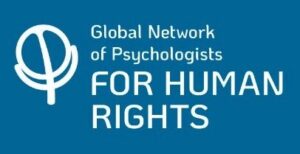Note from the Editors: The website of the Global Network of Psychologists for Human Rights (GNPHR) contains articles, events and news about the domain where psychology and human rights intersect. The information presented in this Bulletin is gathered from many sources and reflects many opinions. The publication of information does not imply that the GNPHR as a network, the GNPHR Steering Committee as a committee, or the individual subscribers share the views and beliefs expressed. The goal of the many opinions expressed is to stimulate reflection, discussion, and informed dialogue.

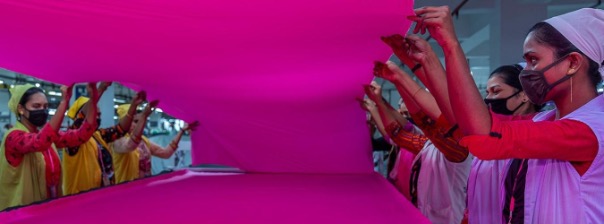
SPECIAL FOCUS in this month’s Bulletin is on the World Day of Social Justice, 20 February.
This idea has gained traction among proponents who argue it enables societies and economies to function more cohesively when social justice is prioritized. Supporters contend that promoting decent work and a fair globalization agenda focused on fundamental rights, employment opportunities, social protections, and constructive social dialogue between governments, employers, and workers is key to putting social justice at the core.
However, advocates point out the persisting grave injustices, widespread labour insecurity, high inequality, and unravelling social contracts exacerbated by global crises. These harsh realities threaten progress made on social issues. Reinforcing institutions and policies that truly advance social justice is seen as an urgent priority.
Table of Contents
SPECIAL SECTION
 SPECIAL FOCUS: World Day of Social Justice
SPECIAL FOCUS: World Day of Social Justice
Background
The International Labour Organization (ILO) unanimously adopted the ILO Declaration on Social Justice for a Fair Globalization on 10 June 2008. This is the third major statement of principles and policies adopted by the International Labour Conference since the ILO’s Constitution of 1919. It builds on the Philadelphia Declaration of 1944 and the Declaration on Fundamental Principles and Rights at Work of 1998. The 2008 Declaration expresses the contemporary vision of the ILO’s mandate in the era of globalization.
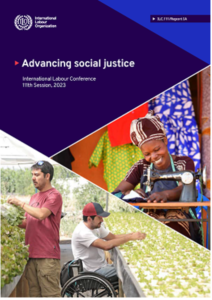 Advancing social justice, Report I(A)(Rev.) – Report of the Director-General of the ILO
Advancing social justice, Report I(A)(Rev.) – Report of the Director-General of the ILO
The report of the ILO Director-General to the International Labour Conference focuses on the need for greater social justice globally and the means to achieve it, and highlights the opportunities that exist, both nationally and internationally, for furthering the ILO’s human-centred and rights-based approach.
This content is available in العربية, Deutsch, español, français, português, Русский, Türkçe, 中文 .
PDF:
https://www.ilo.org/wcmsp5/groups/public/—ed_norm/—relconf/documents/meetingdocument/wcms_882219.pdf
2024 Commemorative Events. 20 February 2024, 3 – 16 (GMT-5). New York, USA – virtual streaming live here
World Day of Social Justice reminds us each year of the need to build fairer, more equitable societies. The International Labour Organization (ILO) marks the occasion this year with a series of six events held in major cities around the globe. The events bring together high-level speakers from across the world of work to discuss how to put social justice at the centre of international, national and regional policy agendas.
Social Inclusion
UN Department of Economic and Social Affairs
The World Summit for Social Development in Copenhagen in 1995 defined an inclusive society as “a society for all’, in which every individual, each with rights and responsibilities, has an active role to play (United Nations, 1995, para 66). Such an inclusive society is equipped with mechanisms which accommodate diversity, and facilitate/enable people’s active participation in their political, economic and social lives. As such, it over-rides differences of race, gender, class, generation, and geography, and ensures equal opportunities for all to achieve full potential in life, regardless of origin.
Social inclusion is the process by which efforts are made to ensure equal opportunities – that everyone, regardless of their background, can achieve their full potential in life. Such efforts include policies and actions that promote equal access to (public) services as well as enable citizen’s participation in the decision-making processes that affect their lives.
Social cohesion is a related concept that parallels that of social integration in many respects. A socially cohesive society is one where all groups have a sense of belonging, participation, inclusion, recognition and legitimacy. Such societies are not necessarily demographically homogenous. Rather, by respecting diversity, they harness the potential residing in their societal diversity (in terms of ideas, opinions, skills, etc.). Therefore, they are less prone to slip into destructive patterns of tension and conflict when different interests collide.
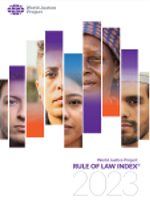 The World Justice Project Rule of Law Index ® 2023
The World Justice Project Rule of Law Index ® 2023
The global rule of law recession continues.
The 2023 WJP Rule of Law Index® evaluates 142 countries and jurisdictions around the world. For the sixth year in a row, the rule of law has declined in most countries.
The World Justice Project® (WJP) is an independent, multidisciplinary organization working to create knowledge, build awareness, and stimulate action to advance the rule of law worldwide. Effective rule of law reduces corruption, combats poverty and disease, and protects people from injustices large and small. It is the foundation for communities of justice, opportunity, and peace—underpinning development, accountable government, and respect for fundamental rights. Traditionally, the rule of law has been viewed as the domain of lawyers and judges. But everyday issues of safety, rights, justice, and governance affect us all; everyone is a stakeholder in the rule of law. Based on this, WJP pursues a multidisciplinary approach to advancing the rule of law.
R2P Monitor
R2P Monitor is a quarterly publication applying the atrocity prevention lens to populations at risk of mass atrocities around the world. Issue 67 looks at developments in Afghanistan, Cameroon, the Central Sahel (Burkina Faso, Mali and Niger), China, Democratic Republic of the Congo, Ethiopia, Haiti, Israel and the Occupied Palestinian Territory, Myanmar (Burma), Nicaragua, Nigeria, Sudan, Syria, Ukraine, Venezuela, Central African Republic, South Sudan and Yemen. Updates for the Democratic People’s Republic of Korea and Eritrea are available on the R2P website.
GNPHR NEWS AND EVENTS
Join us for a March GNPHR / ICP Webinar
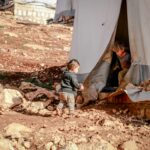 20 March 2024
20 March 2024GNPHR Steering Committee Member Wilson López-López Receives Award
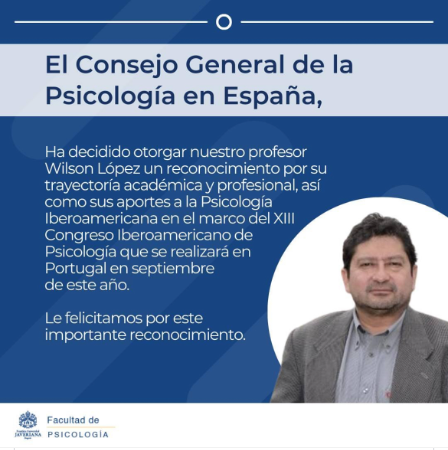 Wilson López-López, GNPHR Steering Committee member from Colombia received recognition from the General Council of Psychologists of Spain for his work, career and impact on psychology in the Ibero-American context
Wilson López-López, GNPHR Steering Committee member from Colombia received recognition from the General Council of Psychologists of Spain for his work, career and impact on psychology in the Ibero-American context
2024 GNPHR Steering Committee News
- George Drazenovich, Canada joined the GNPHR Steering Committee (see the steering committee here)
- GNPHR will host a town hall for its Advisory Council March 21, 2024 at 9 am UTCand 9 pm UTC.
- If you are interested in helping out with GNPHR projects (human rights and psychology bibliography; finding entries for the monthly Bulletin) please contact GNPHR at globalnetworkgnphr@gmail.com
GNPHR Announces New Award
 Education in Human Rights & Psychology Recognition Award.
Education in Human Rights & Psychology Recognition Award.
This award acknowledges outstanding educational materials for human rights education for psychologists. See more and submit a nomination here: Education in Human Rights Award
Psychology Organizations and Human Rights
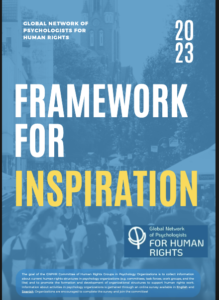
- GNPHR published a guiding document for psychology associations that want to begin or engage a human rights committee / task force / section. Read it here: Framework for Inspiration
- Network Human Rights and Psychology Groups is open to representatives of psychology associations that have established a committee, office, or subgroup focused on psychology and human rights. If you are interested in joining the group please register your interest (1) here; (2) link for the minutes; (3) presentation about human rights and ethics.
CONTENT AREAS AND NEWS
General
Working class economic insecurity and voting for radical right and radical left parties
Take Sipma, Marcel Lubbers, Niels Spierings, Social Science Research 109 (2023). Free article.
Abstract: The radical right’s rise is widely assumed to go hand-in-hand with increasing economic insecurity, as manual workers are considered typical radical right voters. We question whether economic insecurity actually drives working class members to vote for radical parties, both right and left. Using European Social Survey data from 12 Western European countries (2002-2014), we tested whether less secure employment links to vote for such parties. We did this by distinguishing people in permanent employment from those in the same social class but not in permanent employment. Our outcome was surprising: whereas perceived job insecurity correlated with radical right voting, actual economic insecurity in terms of temporary employment was not associated with greater likelihood of voting for a radical right party among the working class. Instead, it was the radical left for which we found indications that it appealed more to groups of people in such an insecure economic position.
Kurt F. Geisinger and Dragos Iliescu, Applied Psychology Around the World | Volume 5, Issue 1, 2023, p. 9-21, February 2023.
In this paper, we discuss the interrelationship of three important documents regarding the role of psychologists in assuring human rights. The first document is the well-known United Nations Statement of Human Rights. The second is the Universal Declaration of Ethical Principles for Psychologists. We note that the primary article (i.e., Gauthier et al., 2010) describing those ethical principles is subtitled, “A Culture-Sensitive Model for Creating and Reviewing Codes of Ethics.” The third document is the International Declaration of Core Competencies in Professional Psychology (Bartram et al., 2022). After briefly describing each of these documents, we interrelate them with the thesis that the core competencies and ethical principles of psychologists should be implemented in psychologist training programs and licensure frameworks and they should be used toward the assurance that human rights are protected, insulated, and prophylactically insured.
There is a way out of cancel culture – but it’s not free speech
Andy Hargreaves, Times Higher Education,February 15, 2024
A competing human rights framework would help the likes of Jo Phoenix and her critics into a dialogue shaped by active listening, says Andy Hargreaves.
Women’s and transgender rights are just one spiky cultural controversy in our educational institutions. Whether it’s islamophobia v antisemitism, immigration v national identity, or religious freedom v homophobia and patriarchal oppression, we are being drawn into conflicts that seem almost irreconcilable. And it isn’t just the OU that is finding it hard to navigate such terrain. In my opinion, most universities are responding in utterly dysfunctional ways.
Two-thirds of US higher education institutions, for example, now offer anti-bias training. Yet an extensive review has concluded that such training “doesn’t reduce bias, alter behaviour or change the workplace”. Indeed, it often increases bias by dividing people into binaries of those who are unarguably privileged and those who are unambiguously oppressed. For example, all those with white privilege – even those who grew up in poverty – are set against all BIPOC (Black, Indigenous and people of colour), including wealthy political leaders or royalty. This is despite the fact that, in the UK alone, 3 million people are mixed race and self-reported rates of discrimination are also high among people who are Irish, Jewish and Roma/Travellers.
In response, some academics oppose cancel culture with freedom of speech. The problem, though, is not just that free speech can permit hateful views to be aired. The libertarian stance simply allows clashing positions to coexist. It doesn’t offer ways to bring people’s perspectives and rights closer together in a democratic intellectual community.
There is a better way than condoning a cacophony of views. That is to replace a framework of individual human rights, pursued at the expense of anyone else’s rights, with what is known as competing human rights.
Is There a Right to Die with Dignity?
Human Rights attorney Dániel Karsai filed a case with the European Human Rights Court. Here is his opinion piece on the topic
The Right To Die Like The Trees: Standing. Dániel András Karsai, 03 November 2023.
My name is dr. Dániel András Karsai. I am a human rights attorney. I am also terminally ill.
In August 2022, I was diagnosed with ALS. ALS – the legendary physicist Stephen Hawking suffered from the same disease – is a so-called motor neurone disease. For reasons unknown to medical science, this disease causes nerve cells that move the muscles to deteriorate, leading to muscle atrophy and ultimately complete paralysis.
In my personal and professional opinion, the total ban on end-of-life decisions in Hungary violates my fundamental human rights, in particular the right to self-determination based on human dignity, the prohibition of inhuman and degrading treatment, and the right to freedom of choice of ideological belief. As there is no legal remedy for this violation in Hungary, I lodged an application with the European Court of Human Rights in Strasbourg.
I want to emphasize from the beginning that my application is not a general plea for a complete legalization on a European level of all forms of end-of-life decisions for all types of individuals concerned. The question this application raises is the following: what is the scope of the right to freedom of choice for individuals in a position like mine – that is, those with full mental capacity – regarding end-of-life decisions?
My aim is to use my unfortunate situation to initiate a meaningful and respectful public conversation on the subject of the right to make end-of-life decisions. In the following blog post, I will briefly summarize my personal and legal arguments submitted to the Court.
My case is about dignity. The word “dignity” appears in many international and regional texts and instruments. Although the Convention does not mention that concept, the Court has emphasised that respect for human dignity forms part of the very essence of the Convention.
The Court already stated that an individual’s right to decide when and how their life should end, provided they are in a position to freely form their own judgment and act accordingly, is one of the aspects of the right to respect private life within the meaning of Article 8 of the Convention. Consequently, the subject matter of the present application falls within the ambit of Article 8.
The Court already stated that an individual’s right to decide when and how their life should end, provided they are in a position to freely form their own judgment and act accordingly, is one of the aspects of the right to respect private life within the meaning of Article 8 of the Convention. Consequently, the subject matter of the present application falls within the ambit of Article 8.
Children/Youth
Indigenous children: opportunities for early childhood development through book-sharing
Maureen M Black, The Lancet, 12-1, January 2024.
Indigenous people comprise approximately 6% of the world’s population (486 million people) and represent “distinct social and cultural groups that share collective ancestral ties to the lands and natural resources where they live, occupy, or from which they have been displaced.”
Many children in Indigenous families are raised speaking Indigenous languages, often with limited exposure to dominant languages. Although children benefit from being brought up learning their ancestral culture and languages, Indigenous children experience inequities related to poverty, opportunities, and discrimination that might hinder their early development.
In this issue of The Lancet Global Health, Ann C Miller and colleagues have shown that Indigenous children aged 3–4 years who are from households that speak a minority or Indigenous language are less likely to be on-track developmentally, compared with children from dominant language-speaking households. These differences, based on results on the Early Child Developmental Index (ECDI), were pronounced in the literacy–numeracy and socioemotional domains.
Climate Justice
The 2023 Global Report of the Lancet Countdown. The latest Lancet Countdown report underscores the imperative for a health-centred response in a world facing irreversible harms.
Climate inaction is costing lives and livelihoods today, with new global projections revealing the grave and mounting threat to health of further delayed action on climate change. But bold climate action could offer a lifeline for health. This year’s report launches just weeks before the COP28 which has a health focus for the first time. The findings underscore the opportunity of a lifetime that COP could help deliver – through commitments and action to accelerate a just transition. Without profound and swift mitigation to tackle the root causes of climate change and to support adaptation efforts, the health of humanity is at grave risk.
Our 2023 Report tracks the relationship between health and climate change across five key domains and 47 indicators, providing the most up-to-date assessment of the links between health and climate change.
Explore the key findings of the 2023 report of the Lancet Countdown. Visual summary:
Decolonization / Indigenization
Is There Hope for the Missing and Murdered Indigenous Women?
Rachel Monroe, The New Yorker, February 1, 2024.
A hashtag and a political campaign have brought attention to the epidemic of violence, but a New Mexico woman is fighting case by case.
In 2012, Sheila North, a Canadian journalist and a member of the Cree Nation, began using #mmiw on Twitter posts. As a reporter with the CBC, Canada’s public broadcaster, North had covered many cases of missing Indigenous women.
The Canadian inquiry ended with two hundred and thirty-one “calls for justice.” Some of the measures involved bolstering law enforcement: the elimination of jurisdictional gaps, improving accessibility to remote regions for major-crime units, and equitable funding for tribal police. But these were balanced with other suggestions—funding shelters, expanding access to health care, and ending the “social, economic, cultural, and political marginalization” of Indigenous women and girls. “We want to have a fair shot at a good education, good jobs, a good life, at having our human rights upheld,” North said. “If things don’t change at a higher level, in terms of policies and procedures and laws to make things more equitable, the statistics will remain the same.”
 New Website: www.decolpsych.com
New Website: www.decolpsych.com
This is a website constructed by Suman Fernando and Hári Sewell, antiracism activists and writers who worked primarily in the (British) National Health Service in the UK — Suman with a Sri Lankan-Asian heritage and background of psychiatry and psychology; and Hári of African-Caribbean-English heritage and a background of social work management — www.sumanfernando.com & www.hsconsultancy.org.uk. The website logo is a painting by Jaswant Guzder, artist and psychiatrist who lives in Canada, suggesting a movement forward and upward aimed to convert psychology and psychiatry into postcolonial disciplines that can underpin Critical Mental Health.
Frantz Fanon and the Birth of Decolonization
Vaughn Rasberry, The Chronicle of higher education, February 1, 2024. The Review | Essay
When Frantz Fanon was dying of leukemia, he was visited by his old friends Jean-Paul Sartre and Simone de Beauvoir. The three philosophers conversed long into the night. Eventually, though, Sartre started getting tired, and de Beauvoir gently tried to wrap up the conversation. “I don’t like people who conserve their energy,” Fanon sniped. In his brief life, Fanon fought in World War II, earned a medical degree, started a family, headed a psychiatric clinic, wrote three books and numerous articles, and joined a revolution. He was not one to conserve his energy.
Few thinkers in the 20th century equal Fanon’s influence in both academe and radical-activist circles. For scholars, Fanon’s thought inspired what came to be known as postcolonial studies, but has also touched ancillary fields including gender studies, Black studies, continental philosophy, and psychoanalysis. “More than any other writer,” asserts Adam Shatz in his engrossing new biography, The Rebel’s Clinic: The Revolutionary Lives of Frantz Fanon, “Fanon marks the moment when colonized peoples make their presence felt as men and women, rather than as ‘natives,’ ‘subjects,’ or ‘minorities,’ seizing the Word for themselves, asserting their desire for recognition, and their claim to power, authority, and independence.” For activists, Fanon’s writings have provided an uncompromising critique of colonialist logic and an existential guide to revolutionary struggle. What James Baldwin meant to Black America, Shatz argues, Frantz Fanon meant to the third world.
As Fanon famously put it in the “final prayer” that concludes Black Skin, White Masks: “O my body, make of me always a man who questions!”
Disability Rights
Aspirations and accommodations for students with disability to equitably access higher education: a systematic scoping review
Paul A. Bartolo, Michelle Borg, Anne-Marie Callus, Alistair De Gaetano, Marchita Mangiafico, Edward Mazzacano D’Amat2, Carmen Sammut, Ramona Vella Vidal and Jonathan Vincent. Front. Educ., Sec. Educational Psychology. Volume 8 – 2023.
Several international conventions have recognized the importance of equal access to higher education on the basis of ‘capacity’. However, inequalities persist for various groups. This paper presents a systematic scoping review of studies on the aspirations and access needs of students with disability, medical and mental health conditions to equitably participate in tertiary education.
Three main themes were identified. Firstly, the findings showed that a crucial component of the student higher education experience was the development of their own self-identity, addressing stigma and enhancing self-advocacy skills, autonomy, and career prospects. Secondly, the studies described how students struggled for full membership in the university community, calling for a transformation of university physical, social and teaching environments for them to access and participate in academic and social activities. Thirdly, the analysis showed that students valued individual accommodations in both coursework and assessment.
Displaced/Migrants/Refugees/Stateless
The reforms have been hailed as a victory for immigration detainees after years of human rights violations. The changes come after almost a decade of advocacy and litigation work by ENS member ADC Memorial, including as part of ENS’s #LockedinLimbo campaign to end arbitrary detention of stateless people.
The reforms, signed into law in December, limit detention of migrants in immigration removal centres to a maximum of 90 days. Courts will now be required to approve any extension beyond this. Crucially, detainees can appeal to the courts if there is no realistic prospect of them actually being removed. Previously, stateless migrants could be held indefinitely with no recourse to challenge their detention.
“After so many years of working with victims of arbitrary detention, we are delighted that stateless people will no longer languish locked in limbo. While the reforms confirmed our efforts, it also goes to show that we need to keep the work going – real change takes time, and we must persist through every small victory and setback along the way.” said Stephania Kulaeva, Director of ADC Memorial.
Anti-Discrimination Centre Memorial Brussels 28 December 2023
The publication of the Federal Law No. 649–FZ dated 12/25/2023 “On Amendments to the Code of Administrative Offences of the Russian Federation” became a New Year gift for those who have been protecting the rights of migrant detainees for 10 years.
The Law finally introduced a norm on limiting detention in the immigration detention facilities for a period of no more than 90 days and judicial control over the extension of this period if the need for such an extension is stated in a timely (at least 15 days before the expiration date) petition of the Ministry of Internal Affairs. As for the migrant detainees, they can apply for expulsion at their own expense – and the court is obliged to consider such a request within 5 days. Even more importantly, the law directly indicates the right of people placed in the immigration detention facilities to apply to the court in order to verify the legality of their deprivation of liberty “in the presence of circumstances indicating the absence of an actual possibility of expulsion from the Russian Federation” (a person receives this right only after a month of imprisonment, see paragraph 17).
Human Rights Education
Human Rights Education Associates
HREA is an international non-governmental organization that supports human rights education; the training of human rights defenders and professional groups; and the development of educational materials and programming. HREA is dedicated to quality education and training to promote understanding, attitudes and actions to protect human rights, and to foster the development of peaceable, free and just communities.
HREA works with individuals, non-governmental organizations, inter-governmental organizations and governments interested in implementing human rights education programs.
You can search their resource website by Human Rights theme here
International Association for Human Rights Education Conference London, Friday 19 April 2024
The IAHRE/ HRE conference is a meeting place for human rights education schools and practitioners and all working for social justice through education. We will be joined from speakers from Japan, South Africa, USA and many European countries. Readers of HRER are especially welcome. The full programme is now published (below) with details of our keynote speakers, Prof Sonia Livingstone and Professor Farzana Sahin. Early bird rates are available. Discounts are also available for IAHRE members. Visit https://global-iahre.org/ Do share this information in your networks and on social media.
Inclusion, Exclusion, Racism
 How can we fight for racial justice? Lessons from Young Black Changemakers
How can we fight for racial justice? Lessons from Young Black Changemakers
Laura Wray-Lake, Elan C. Hope and Laura S. Abrams (Eds.) The events of 2020 are unforgettable. What do you most remember when you look back on this time? Surely, the COVID-19 pandemic comes to mind. Also, the presidential election. We can’t forget May 25th, 2020, when George Floyd was murdered by police in the streets of Minnesota, and the racial awakening and reckoning that followed. There were protests – the largest in U.S. history. Books about racial justice were flying off the shelves. Corporations launched anti-racism campaigns; and schools and communities across the nation made commitments to anti-racist policies, education, and new practices. Some lasting changes were made. Some of the fervor felt temporary. There was also- not surprisingly- a strong backlash against racial justice progress.
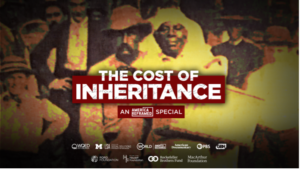 The Cost of Inheritance – Film about Reparations
The Cost of Inheritance – Film about Reparations
THE COST OF INHERITANCE, an America ReFramed special, explores the complex issue of reparations in the U.S. using a thoughtful approach to history, historical injustices, systemic inequities, and critical dialogue on racial conciliation. Through personal narratives, community inquiries, and scholarly insights, it aims to inspire understanding of the scope and rationale of the reparations debate. PBS TV SERIES – available through April 2024.
1-hour documentary available on WORLD: https://worldchannel.org/press/article/america-reframed-cost-of-inheritance-coming-2024/
 Antisemitism and Immigration in Western Europe Today. Is there a connection?
Antisemitism and Immigration in Western Europe Today. Is there a connection?
Muriel Sacco and Marco Martiniello, 2018. The link between the rise of antisemitism and the arrival of new MENA Migrants has been investigated and not confirmed. The report goes through existing data on antisemitism and new migrants’ flows and is based on in-depth interviews with associative leaders and social workers in daily contacts with new migrants.
The case of the Netherlands. Annemarike Stremmelaar and Leo Lucassen. Published by Foundation Remembrance, Responsibility and Future (EVZ), Berlin and the Pears. Institute for the study of Antisemitism, University of London, April 2018.
The case of Germany, Mathias Berek, 2018.
Huge rise in antisemitic abuse in UK since Hamas attack, says charity
Harriet Sherwood, The Guardian, 15 Feb 2024.
589% increase in number of incidents described as ‘watershed moment for antisemitism in the UK’. The scale of the surge in antisemitism in the UK since Hamas’s attack on Israel on 7 October has been revealed, in data showing a 589% increase in the number of incidents compared with the same period in 2022. The Community Security Trust (CST), which monitors anti-Jewish abuse and attacks and provides security for UK Jewish communities, said the unprecedented increase was a “watershed moment for antisemitism in the UK”.
It recorded 4,103 antisemitic incidents in the UK in 2023, the highest total in a calendar year reported to the organisation. Two-thirds of the 2023 incidents occurred after 7 October – 2,699, compared with 392 over the same time period in 2022.
LGBTQI+, Gender Rights
Pope Francis Allows Priests to Bless Same-Sex Relationships
Jason Horowitz, NY Times, December 18, 2023. A church official said the blessings amounted to “a real development” that nevertheless did not amend “the traditional doctrine of the Church about marriage.”
Mental Health and Human Rights
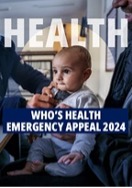 Health Emergency Appeal
Health Emergency Appeal
WHO, 15 January 2024
In 2024, almost 300 million people will require humanitarian assistance and protection, with an estimated 166 million people requiring health assistance. Conflict and the climate crisis have affected healthcare and deepened threats around the world, and at least five WHO regions are now impacted by worsening conflict and security including the desperate situations in Gaza, Sudan and Ukraine. For those facing emergencies, disruptions to health services often mean the difference between life and death.
The threats of climate change, extreme weather events, food insecurity, conflict and displacement are intersecting, causing deeper and increasingly complex health emergencies. In 2024, almost 300 million people will require humanitarian health assistance and protection, and at least 15 emergencies are expected to require the highest level of intervention. At least five WHO regions are impacted by worsening conflict and insecurity, including desperate situations in Ethiopia, Haiti, Myanmar, the occupied Palestinian territory, Sudan, and Ukraine. For those facing emergencies, disruptions to essential health services often mean the difference between life and death. From mothers giving birth during conflict, to aid to young children in drought-affected regions, to those receiving cancer treatment or dialysis, health care saves lives. Health care services are also critical for breaking the cycle that too often leaves communities in a perilous state and reliant on yet more emergency assistance.
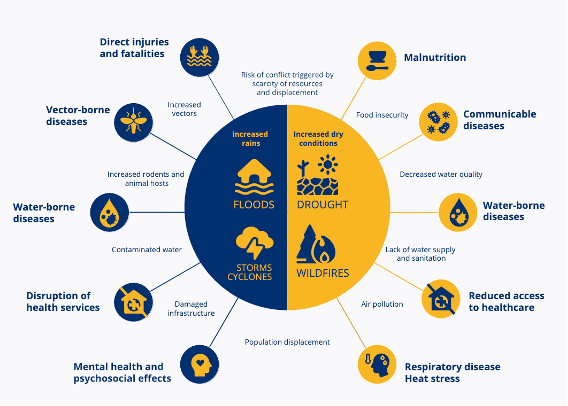
Combatting intergenerational effects of psychotrauma with multifamily therapy
Trudy Mooren, Elisa van Ee, Irma Hein and Julia Bala, Frontiers in Psychiatry, 2023.
There is growing evidence that parental trauma is associated with psychosocial disorders, externalizing and internalizing problems, and higher sensitivity to posttraumatic stress disorder (PTSD) in children. Recent research findings suggest multidimensional relational, psychological, and neurobiological interrelated pathways of intergenerational influence. Moreover, the intergenerational effects of parental trauma need to be understood within a broader systemic context, as a part of family adaptation. This article explores research findings and clinical practice to enhance our understanding of intergenerational processes and presents directions for therapeutic interventions. A trauma-focused multi-family therapy, aiming to restrict the relational consequences of parental trauma and strengthen family resilience, is described. The proposition is that to facilitate and improve the quality of parent–child interaction in response to psychotrauma, fostering emotion regulation capacities and mentalization is crucial. These efforts offered through family group interventions may benefit various families coping with adversity in culturally diverse societies.
Peace / Violence and War
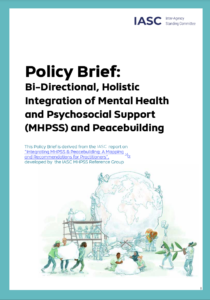 Policy Brief: Bi-Directional, Holistic Integration of Mental Health and Psychosocial Support (MHPSS) and Peacebuilding.
Policy Brief: Bi-Directional, Holistic Integration of Mental Health and Psychosocial Support (MHPSS) and Peacebuilding.
IASC (Inter-Agency Standing Committee), January 2024.
This Policy Brief is derived from the report on “Integrating MHPSS & Peacebuilding: A Mapping and Recommendations for Practitioners”, developed by the IASC MHPSS Reference Group.
How Distrust of Government by Marginalized People Fuels Conflict in Africa
Hany Abdel Latif, Mahmoud El Gamal, IMF (International monetary Fund), January 25, 2024.
Improving people’s relationships with state institutions and ensuring access to services can foster conditions for greater peace and social cohesion in sub-Saharan Africa.
Sub-Saharan Africa suffers from persistent security challenges, and Sahel countries such as Burkina Faso, Chad, Niger, Mauritania, and Mali are particularly afflicted by protracted conflicts and humanitarian crises.
While various factors can fuel conflict, our research shows that discontent with state institutions among marginalized groups is a key driver of unrest in the region. Such distrust reflects perceptions that governments fail to address equity issues and inclusive growth—including the fair allocation of natural resources and human capital development.
Middle East
How the decisions that led to the founding of Israel left the region in a state of eternal conflict.
The Road to 1948. A discussion moderated by Emily Bazelon, February 1, 2024.
One year matters more than any other for understanding the Israeli-Palestinian conflict. In 1948, Jews realized their wildly improbable dream of a state, and Palestinians experienced the mass flight and expulsion called the Nakba, or catastrophe. The events are burned into the collective memories of these two peoples — often in diametrically opposed ways — and continue to shape their trajectories.
If 1948 was the beginning of an era, it was also the end of one — the period following World War I, when the West carved up the Middle East and a series of decisions planted the seeds of conflict. To understand the continuing clashes, we went back to explore the twists and turns that led to 1948. This path could begin at any number of moments; we chose as the starting point 1920, when the British mandate for Palestine was established.
Krieg in Nahost: Sozialpsychologen fordern sofortige Feuerpause und eine Zukunftsperspektive. Zur Befriedung braucht es Unterstützung von außen. Wir, Sozialpsychologinnen und -psychologen, fordern eine unverzügliche Feuerpause für den Gaza-Streifen und Israel, die Entwicklung einer für beide Konfliktparteien akzeptablen Zukunftsperspektive und die ernsthafte Unterstützung bei der Durchsetzung eines Friedensplans durch die Vereinten Nationen, Deutschland, die Europäische Union und die internationale Gemeinschaft.
English: War in the Middle East: Social psychologists demand an immediate ceasefire and a perspective for the future. Achieving peace requires external support. We, social psychologists, demand an immediate ceasefire for the Gaza Strip and Israel, the development of a future perspective acceptable to both parties in the conflict, and earnest support for the enforcement of a peace plan by the United Nations, Germany, the European Union, and the international community.
Peace psychologists are calling for an immediate ceasefire in Gaza
Division 48 of the American Psychological Association, November 1, 2023 .
We, as peace psychologists, join the calls from all around the world for an immediate ceasefire in Gaza. We join the United Nations Secretary-General António Guterres in his appeal “for an immediate humanitarian ceasefire, together with the unconditional release of hostages and the delivery of relief at a level corresponding to the dramatic needs of the people in Gaza, where a humanitarian catastrophe is unfolding in front of our eyes.”
We, as peace psychologists, remind the world that there is no military solution to the current crisis. There can be no peace without justice.
Witnessing Palestine
Scholar and activist Angela Davis joined Frank Barat on Witnessing Palestine to discuss the importance of solidarity with Palestinians as they face genocide in Gaza by Israel. Now on YouTube.
Saher Yaghi, psychologist
Nadda Ostman, MIDDLE EAST EYE, 17 February 2024.
Shaher Yaghi, a professor and renowned psychologist, worked for Gaza’s education ministry and was found dead after an Israeli air strike on the Jabalia refugee camp in December. He was killed alongside his wife and children, a neighbour and family friend announced on social media on 10 December.
Yaghi worked with several non-profit organisations and was a school quality assurance coordinator for over nine years. He also worked with Unrwa as a special educational needs supervisor as well as a mental health counsellor. He graduated from the University of Calgary in 1994 with a bachelor’s degree in rehabilitation, and then went onto study at the Islamic University of Gaza, where he achieved a master’s degree in psychology in 2006.
Five lessons from Meron Mendel’s ‘Talking about Israel’
Julia Hitz, Deutsche Welle, May 15, 2023.
Meron Mendel’s new book, “Über Israel reden” (“Talking about Israel”), examines how Israel is debated in Germany. A descendant of Holocaust survivors, Mendel was born in 1976 and grew up on a kibbutz in Israel. He emigrated to Germany in 2003. Since 2010, he has been the director of the Anne Frank Educational Center in Frankfurt.
Statement by Principals of the Inter-Agency Standing Committee: We cannot abandon the people of Gaza
WHO, 30 January 2024
The allegations of involvement of several UNRWA staff in the heinous attacks on Israel on 7 October are horrifying. As the Secretary-General has said, any UN employee involved in acts of terror will be held accountable. However, we must not prevent an entire organization from delivering on its mandate to serve people in desperate need.
Withdrawing funds from UNRWA is perilous and would result in the collapse of the humanitarian system in Gaza, with far-reaching humanitarian and human rights consequences in the occupied Palestinian territory and across the region.
The Peace Activists Divided by Oct. 7
Susan Dominus, NY Times, Dec. 17, 2023.
“I feel betrayed on such a deep level.” Tamar Shamir read the message on her phone in surprise. Another followed: “I just want to puke.” Shamir, a 53-year-old peace activist, was at her home not far from Haifa, in northern Israel, on Oct. 8, the day after Hamas’s deadly attack. Shamir was checking in on a WhatsApp group of young adult Israelis, members of a program Shamir often worked with called Young Ambassadors for Peace.
Poverty
Child poverty in 2023: inequity in times of crises
Editorial, The Lancet, Volume 7, ISSUE 11, P747, November, 2023.
A new report by the World Bank and UNICEF presents global, regional, and national child poverty estimates and nowcasts that in 2022, 333·3 million children younger than 18 years (15·9%) were living in extreme poverty—ie, surviving with less than US$2·15 daily. The share of the extreme poor who are children increased from 47·3% in 2013 to 52·5% in 2022, with children aged 0–9 years being the most affected. Although rates of extreme child poverty have returned to 2019 levels after a surge during the COVID-19 pandemic, urgent action is needed to lift and keep children out of poverty, especially against the current backdrop of conflict, climate change, and the cost-of-living crisis.
Much of extreme child poverty is clustering in economically fragile regions: more than 70% live in sub-Saharan Africa. Madagascar, Burundi, South Sudan, and Malawi each have national extreme child poverty rates above 75%. But economic development does not necessarily protect children from poverty; in fact, as countries become wealthier, children are often left behind.
 What is ‘limitarianism’? Professor Ingrid Robeyns explain
What is ‘limitarianism’? Professor Ingrid Robeyns explain
An interest in her concept of ‘limitarianism’ is not foreign to Professor of Ethics of Institutions Ingrid Robeyns: (media) attention has been high since 2017. We made an overview, because what exactly does limitarianism mean? And why has Robeyns been campaigning for this concept for years?
The moral wealth limit of limitarianism
“Extreme wealth undermines democracy, is incompatible with ecological urgency, is almost always undeserved, and harms the interests of everyone, the super-rich included.” This is how De Wereld van Morgen (22 February 2021) summarised Robeyns’ findings of research. At a stroke, it clarifies why Robeyns advocates limitarianism, the capping of wealth with a wealth limit. “Just as there is a poverty line.”
Where the line should be drawn is still under discussion. According to Robeyns, this is a moral and political issue, and several lines of reasoning are possible to determine that boundary. One possibility is to draw the line where wealth no longer adds to quality of life. “Our empirical research shows that a large majority of Dutch people (at 2018 price levels) think that at a wealth of 2.2 million, one has more than enough,” Robeyns writes in Vrij Nederland (13 March 2023).
Why Limitarianism
Ingrid Robeyns, The journal of political philosophy, Volume 30, Issue 2, June 2022.
This article discusses ‘limitarianism’, which in its most general formulation is the idea that in the world as it is, no one should have more than a certain upper limit of valuable goods, in particular, income and wealth. What, if anything, does ‘limitarianism’ add to normative political philosophy? Section V argues that within theories of distributive justice, limitarianism is best seen as part of a pluralist account. This is illustrated by sketching the proposal of a pluralist account combining sufficientarianism, opportunity egalitarianism, and limitarianism.
Having too much. Essays on limitarianism
Meijers, T. (2023). Limitarianism and future generations.
In I.Robeyns (Ed.), Having too much (pp. 361–390). Open Book.
How Rich is Too Rich? Measuring the Riches Line.
Ingrid Robeyns, Vincent Buskens, Arnout van de Rijt, Nina Vergeldt, Tanja van der Lippe, Social Indicators Research (2021) 154:115–143, 25 November 2020.
Is it possible to identify a ‘riches line’, distinguishing the ‘rich’ from the ‘super-rich’? Recent work in political philosophy suggests that this is theoretically possible. This study examines for the first time the empirical plausibility of a riches line, based on novel data collected from a representative sample of the Dutch population. The data reveal that the Dutch indeed draw such a line, namely between 1 and 3 million euros. Strikingly, respondents agree on its approximate location irrespective of their own income and education. Although most do not consider extreme wealth itself a severe problem and object to the government’s enforcement of limits to wealth and income, widespread support exists for increased taxation of the super-rich if that would improve the quality of life of the most vulnerable members of society.
REGIONAL HUMAN RIGHTS NEWS – Spanish – El Boletín
Los derechos humanos en los códigos de ética de los psicólogos
Elizabeth Beatriz Ormart, XIV Jornadas de Investigación y Tercer Encuentro de Investigadores en Psicología del Mercosur. Facultad de Psicología – Universidad de Buenos Aires, Buenos Aires, 2007.
RESUMEN
El presente trabajo toma en consideración los Códigos de Ética de los Colegios de psicólogos de la República Argentina. Nuestro análisis se centra específicamente en aquellos puntos en los que se relacionan el respeto de los derechos humanos y el ejercicio de la profesión.
Ciudadanos del común y construcción de paz. Creencias sociales sobre el perdón, la justicia y la reconciliación en Colombia.
Juan David Villa Gómez, Wilson López-López, Lina Marcela Quiceno, Eliana María Urrego-Arango, Universidad Pontificia Bolivariana, Colombia, October 2023.
Este artículo indaga por procesos que, desde una perspectiva psicosocial, se vinculan significativamente: el perdón, la justicia, la reconciliación y la paz. Se presentan así parte de los resultados de la investigación “Barreras psicosociales para la construcción de la paz y la reconciliación en Colombia”, que se realizó durante 2019 y el primer semestre de 2020. El objetivo de este trabajo fue comprender creencias sobre el perdón, la justicia y la reconciliación de 256 personas de nueve ciudades de Colombia. Se usaron un diseño cualitativo y un método fenomenológico-hermenéutico, a través de entrevistas semiestructuradas y en profundidad. Se realizaron un análisis intratextual e intertextual de contenido, y una codificación teórica de primer nivel (descriptivo) y segundo nivel (hermenéutico), de donde emergieron cinco categorías: 1) perdón condicionado y justicia retributiva; 2) ni perdón ni olvido: pena de muerte y retaliación punitiva; 3) perdones compensatorios y justicia transicional; 4) deslegitimación de la justicia transicional: los ofendidos; y 5) oportunidades para la reconciliación. Los principales resultados permiten observar que entre los participantes prima una perspectiva retributiva de la justicia, que limita las posibilidades de perdón y reconciliación en el marco del acuerdo de paz entre el Estado colombiano y la guerrilla de las FARC-EP.
PUBLICATIONS
 Ensaios de Psicologia Crítica, Thomas Teo, Coleção História, Psicologia, Sociedade, Volume 3, 2023, Editora CRV.
Ensaios de Psicologia Crítica, Thomas Teo, Coleção História, Psicologia, Sociedade, Volume 3, 2023, Editora CRV.
This book is important for its demonstration that training for Psychology professionals must change to respond to Brazil’s social demands. Building a psychological theory that addresses challenges in the daily lives of the majority of the Brazilian population requires taking a political stance. Thomas Teo speaks vehemently about the importance of constructing theories based on praxis and activity.
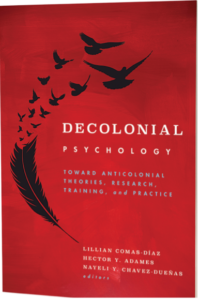 Decolonial psychology: toward anticolonial theories, research, training, and practice
Decolonial psychology: toward anticolonial theories, research, training, and practice
Lillian Comas-Díaz, Hector Y. Adames, and Nayeli Y. Chavez-Dueñas, APA, January 2024.
This book offers an expert synthesis of the scholarly literature on approaches to decolonial psychology, its historical foundations, education and training, and psychological practice.
From its inception, psychological science and practice in the United States has been framed predominantly by Eurocentric epistemologies. As a result, oppressed people have internalized the belief that their culture and values are inferior to those of dominant groups. Infusing a decolonial lens into psychology is one way for the field to become more inclusive and relevant to the numerical majority worldwide.
Decolonial psychology creates space and methods for oppressed and impoverished communities to radically imagine their existence outside of the superimposed borders of coloniality, neoliberalism, racism, and other systems of oppression. It emphasizes how people’s subjectivity and connections to diverse social groups are influenced by history, context, and oppression; how these populations actively resist and survive attacks on their humanity; and how knowledge production is shaped not only by how data is interpreted but also by the questions asked.
The chapters in this book provide an opportunity for readers to deepen their understanding of how colonization and coloniality impacted knowledge creation in society and the field of psychology, including thought-provoking resources that explore the subject matter. The book also underscores how coloniality continues to reverberate in many aspects of psychology today. Collectively, the authors invite readers to resist engaging in psycolonization by generating ideas and pathways to help reclaim, honor, and celebrate Indigenous ways of knowing and being. The volume offers guidance on methods to disrupt psycolonization and its epistemic violence, helping to provide a roadmap to decolonial psychology and anticolonial futures.
It is time to confront the limitations of mainstream psychology. This book will help psychologists at all levels anchor their research, teaching, and practice in decolonial methods and practices.
OPPORTUNITIES
Rubin/Flores Student Research Award (human rights focus) – Nominations Open
Division 52, International Psychology, offers Rubin/Flores Student Research Award which seeks to inspire students to explore and to think critically about the intersection of psychology and human rights. This award recognizes the contributions of undergraduate and graduate students in psychology throughout the world to advance human rights globally. This award has been established to encourage students to integrate human rights into science, application and intervention models in the field of psychology.
Nominations deadline is March 15, 2024
Nominations should be submitted HERE. Self-nominations are welcone.
Please direct any questions to the chair of this award Dr. Erinn Cameron ecameron@email.fielding.edu
UPCOMING EVENTS
Webinar, Psychology’s role in human rights
February 29, 2024, 12:00 pm EST / 6:00 pm CET
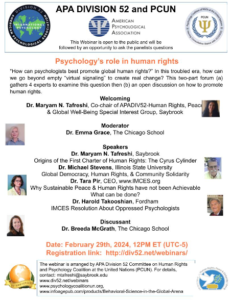
International Association for Human Rights Education Conference London, Friday 19 April 2024
We warmly invite you to join us in London for our 2024 conference. The IAHRE/ HRE conference is a meeting place for human rights education schools and practitioners and all working for social justice through education. We will be joined from speakers from Japan, South Africa, USA and many European countries. Readers of HRER are especially welcome. The full programme is now published (below) with details of our keynote speakers, Prof Sonia Livingstone and Professor Farzana Sahin. Early bird rates are available. Discounts are also available for IAHRE members. Visit https://global-iahre.org/ Do share this information in your networks and on social media.
We invite you to join us in London on 19 April 2024. Registration is now open.

SAR’s Student Advocacy Seminars provide university and college students with the opportunity to develop human rights research and advocacy skills through direct engagement on behalf of threatened members of the global higher education community in cooperation with SAR’s Academic Freedom Monitoring Project and Scholars in Prison Project. Read the Student Advocacy Handbook to learn more.
To learn more, contact SAR’s Student Advocacy Seminar Coordinator Adam Braver at adam.braver@nyu.edu
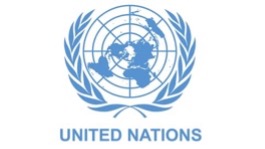 You can follow the meetings of the Human Rights Council by the United Nations Web TV:
You can follow the meetings of the Human Rights Council by the United Nations Web TV: CONTACTS: Published by the Global Network of Psychologists for Human Rights – www.humanrightspsychology.org
Disclaimer: The website of the Global Network of Psychologists for Human Rights (GNPHR) contains articles, events and news about the domain where psychology and human rights intersect. The information presented in this Bulletin, does not imply that the GNPHR shares the views and beliefs in the articles.
- @GNPHR1
- How to get involved – read how you can contribute to the global network
- Consider contributing a Blog/Commentary
- News and Bulletins from the GNPHR – Subscribe to GNPHR
- Email addresses:
Ways to Participate in Global Network Activities
- Student/young person representation on the GNPHR Steering Committee
Are you a student or young person (under 35 years of age) interested in joining the GNPHR Steering Committee? The GNPHR invites applications. Role description: The terms of reference broadly define the roles of all members of the steering group. Individual steering committee member tasks include : Each member will take responsibility for one of the following: (a) A specific content area or group of areas; (b) A specific project (e.g. survey of human rights reporting mechanisms; survey of educational programs in psychology/human rights, etc); (c) A specific function: for example, organizing a newsletter; soliciting commentary or newsletter blogs; seeking grant possibilities; outreach to general human rights organizations; outreach to psychology organizations or (d) Consultation: Working in collaboration with other organisations where there is a specific issue. In addition, from time-to-time, short-term subgroups may work on specific projects. In addition, for the student member, there would be a specific remit to liaise with other organisations that are focussed on younger people, psychology and human rights. Click here if you are interested in being nominated. - Share Your Experiences and Examples
One of the best ways to illustrate the intersection of psychology and human rights is through example. We are looking for examples of your encounters with human rights issues in your professional life. You might describe a time when you protected (or failed to protect) human rights, or advocated for what you saw as a human rights issue. The events might be in your clinical, research, academic, applied, or volunteer work. Please send your narrative / story (500-1000 words) to Marlena Plavšić (marlena_plavsic@hotmail.com). We will compile these for publication in the GNPHR Bulletin and on the website. Please also indicate if you would like your stories to remain anonymous. - Share your Expertise and Opinions
We invite you to contribute a blog or opinion piece on general human rights issues; human rights education or strategies for raising the profile of human rights within psychology or your professional life. Students are welcome to contribute, including on student needs for learning about and addressing human rights. Please contact the GNPHR Blog editor (blogeditor@humanrightspsychology.org) with ideas for the article you would like to write! - Send articles/news/events
If you come across a human rights article or news, or know of an upcoming hunman rights event, please send for publication in the Bulletin. Send to the Bulletin editor Polli Hagenaars (polli.hagenaars@gmail.com).

